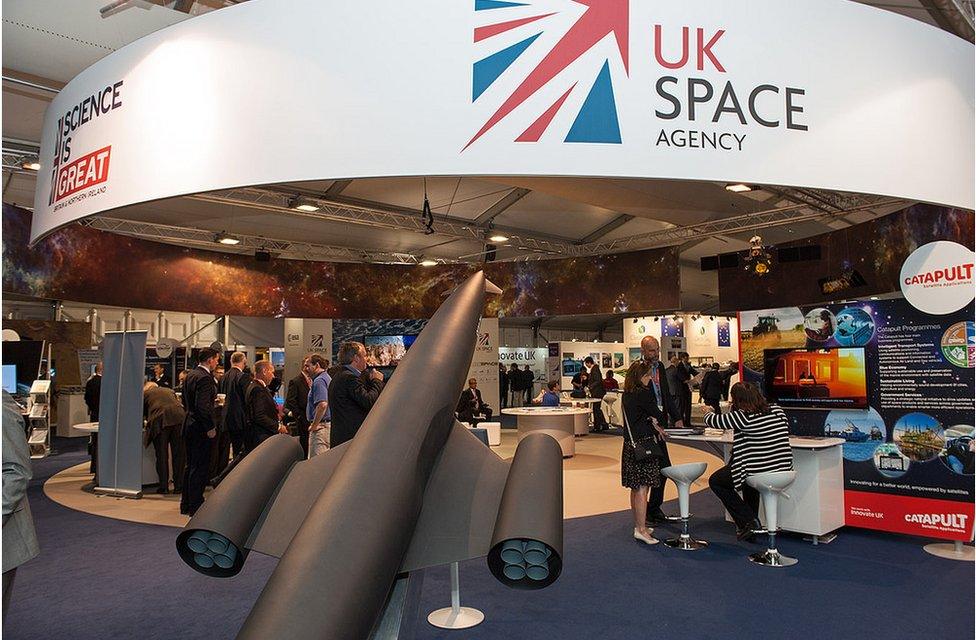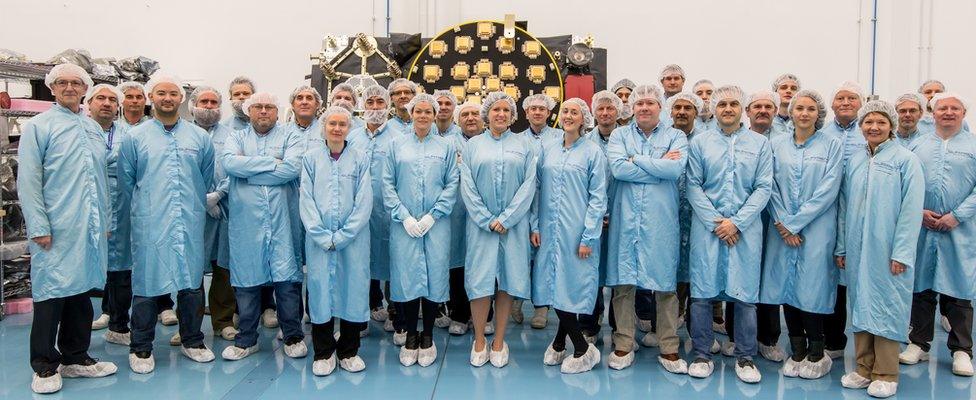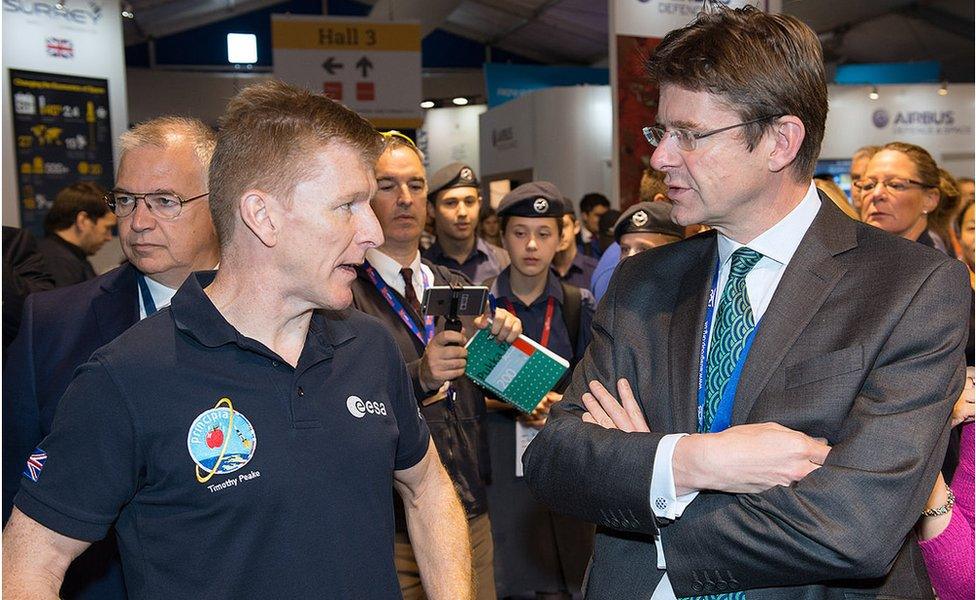Tim Peake, Brexit and the UK space sector
- Published
Tim Peake: Care will be needed when it comes to science
It was inevitable that Tim Peake would be asked about Brexit at the Farnborough International Air Show, external.
The visit - his first public engagement since returning from orbit - drew huge crowds, and everyone wanted to know what he had to say on the topic of space science and the industry that supports it.
Astronauts are well trained and speak very deliberately, of course. But in his BBC interview, Major Tim wanted to put down a few markers.
"From the point of view of the European Space Agency (Esa), the UK's participation is not affected by this EU referendum. Esa is a separate entity [to the EU]," he told BBC Breakfast.
"What we do have to be careful of is science, which will be affected by the EU Referendum, and I know that there are many people involved in science in the UK who're concerned about how that's going to be affected. So, there are certainly many areas that we need to be focussed on as we move forward, as we try to make the best for Britain out of this decision."
For the space industry, Farnborough is an important showcase.
Yes, the aeroplanes take centre stage, but the satellite sector is also very well represented. And it has a lot currently to brag about, with substantial growth year-on-year now for more than a decade.

This is a sector that has enjoyed considerable success in recent years
And yet, like Tim Peake, the executives at the air show find themselves grappling with uncertainties.
The truth is no-one really knows what the future holds right now.
Only when our EU relationship is re-defined will we have a better idea of what the implications could be.
But in this posting I thought I'd pick up some of the issues being raised by senior space industry executives attending Farnborough this week.
On the UK and Esa - Tim is quite correct. The agency is a separate legal entity to the EU. But it is worth noting that Brussels now is the single largest contributor to the agency's budget.
The EU is using Esa as its technical agent on two multi-billion-euro space programmes - the Galileo satellite navigation system, and the Copernicus Earth observation programme.

SSTL's Galileo team: The UK's space companies rely on access to foreign engineering talent
In Galileo, the UK is an absolutely key player, assembling the navigation payloads - essentially the "brains" - for every satellite in the network.
Surrey Satellite Technology Limited in Guildford has just responded to the call for bids to make the last few spacecraft needed to complete the network. And at Swanwick, too, there is a centre that - amongst other tasks - will look after the encrypted government signal of Galileo: its "Public Regulated Service".
Viewed today, it seems inconceivable that these two roles - navigation payloads and PRS - could be handled by a country outside the EU, because they are security related.
Unless the UK buys directly back into Galileo somehow, or negotiates some sort of preferential associated country status, then these roles will almost certainly be lost, executives fear.
The cost to UK industry could run to hundreds of millions of euros in future repeat orders.
The UK would also lose influence over a European programme that looks set to play a deep role in our economy.
Already, the American GPS system is thought to support goods and services in the EU economy valued at hundreds of billion of euros per annum.

Artwork: Copernicus is building the largest Earth monitoring programme ever conceived
Likewise, Copernicus is the biggest Earth observation project in the world, providing data on the environment to inform and police EU policies - but also to drive a new economy in environmental services.
We're talking here about everything from catching illegal fishing activity and pollution monitoring, to air quality alerts and "smart agriculture" (knowing when, where and how much fertiliser to apply to fields).
The UK has some interests industrially in producing the Copernicus satellites, and in Newport has one of the main data handling centres. Fortunately, all of this data is free and open, which means, in or out, the UK would still retain access to all of the information. But stepping outside the EU once again risks losing influence over the future direction of this major space programme, say executives - unless care is taken to protect our Copernicus position in the Brexit negotiations.

Business Secretary Greg Clark (R) is delighted to have science and space back in his portfolio
And then, of course, everyone at Farnborough raised that perennial worry over skills gaps and access to foreign engineering talent. One executive said for some positions, his company routinely received no UK applications.
Theresa May's new government has yet to outline its Brexit strategy. But her new Business Secretary came to Farnborough eager to paint a positive outlook.
Greg Clark briefly held the position of science minister in the Conservative-Liberal Democrat coalition and is delighted to be back in charge of a portfolio that once again includes science and space.
"One of the most thrilling aspects of being appointed is that I've got science back," he told me.
"As you know science ties up absolutely to industry and innovation.
"I loved [being science minister] for the year that I did it, and I will be paying a lot of personal attention to it."
And Katherine Courtney, the CEO of the UK Space Agency, was also bigging up what Britain had to offer.
"The UK has world-leading space companies and the EU is going to want the best technology at the best value for money for EU member-state taxpayers. So I have strong confidence in the continuation of UK space firms in future EU procurements, even after the UK completes its exit process."